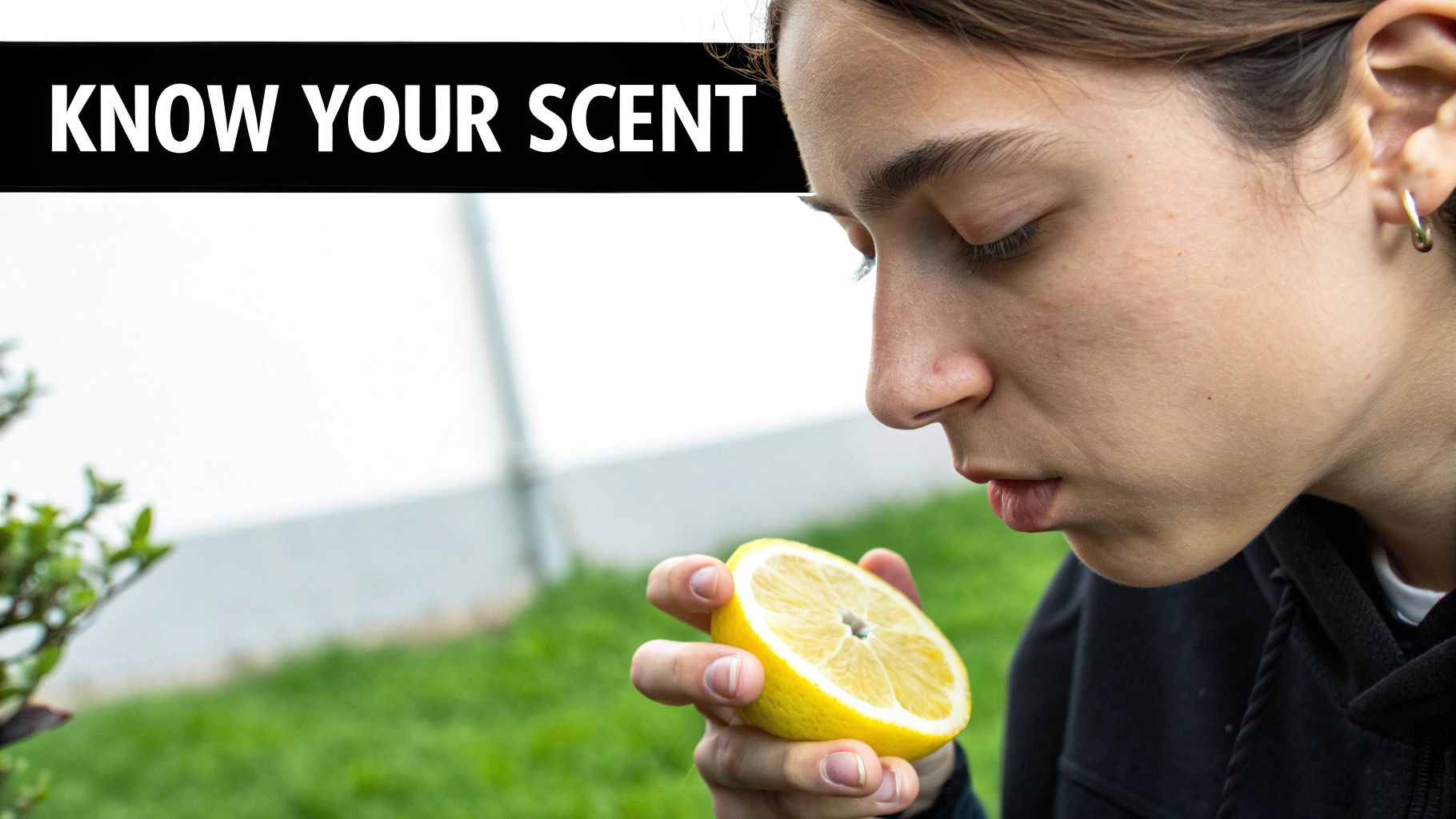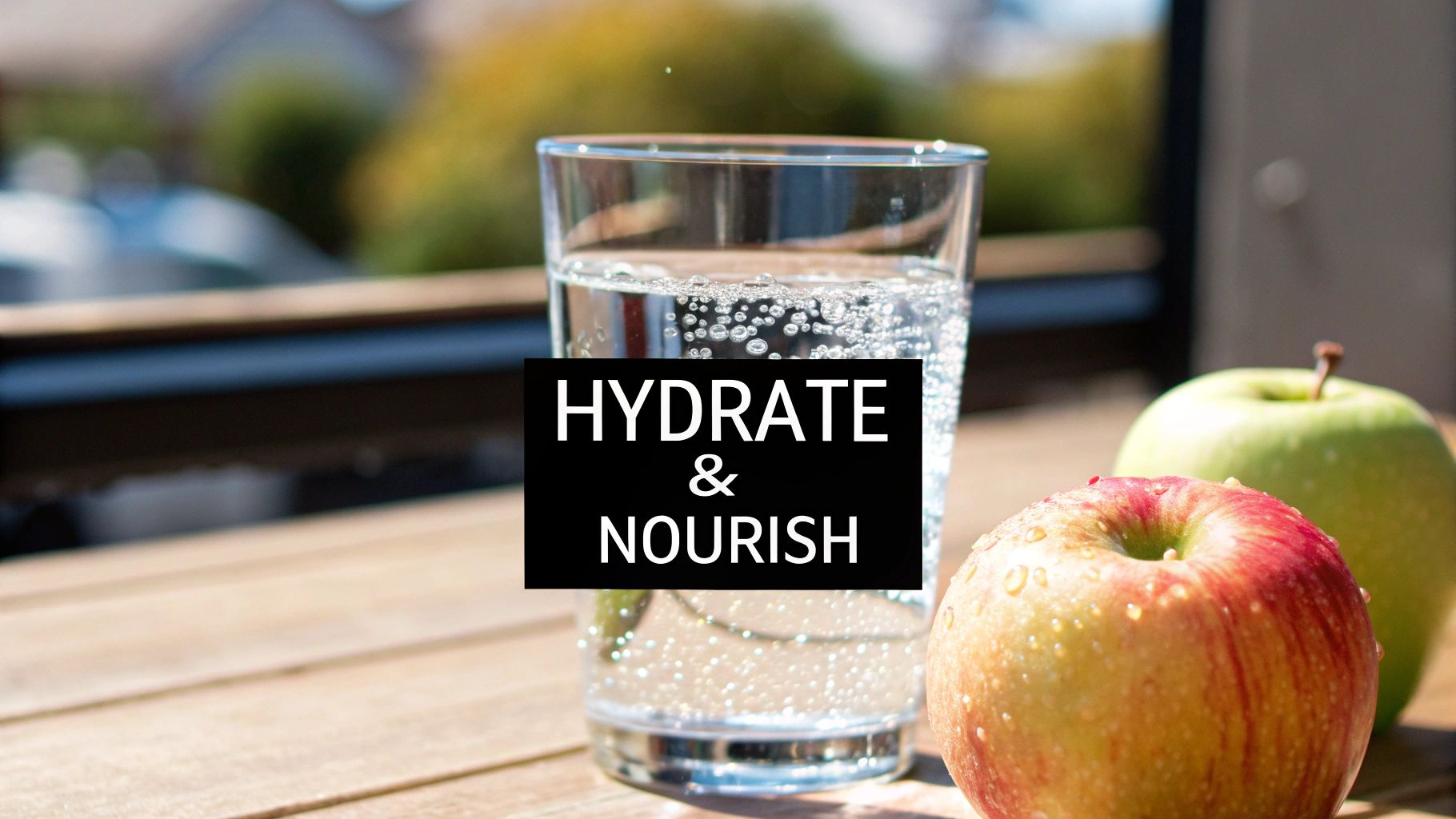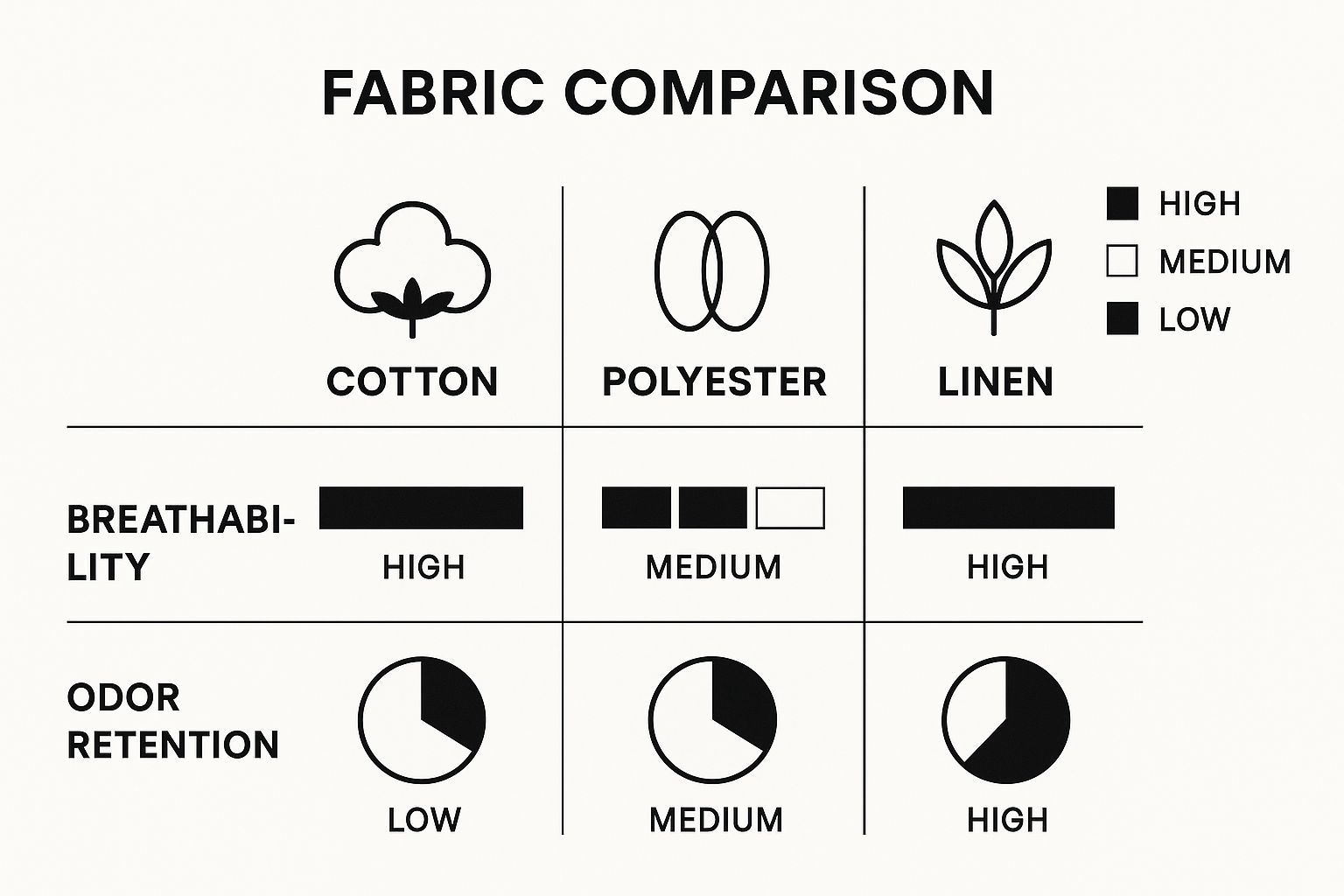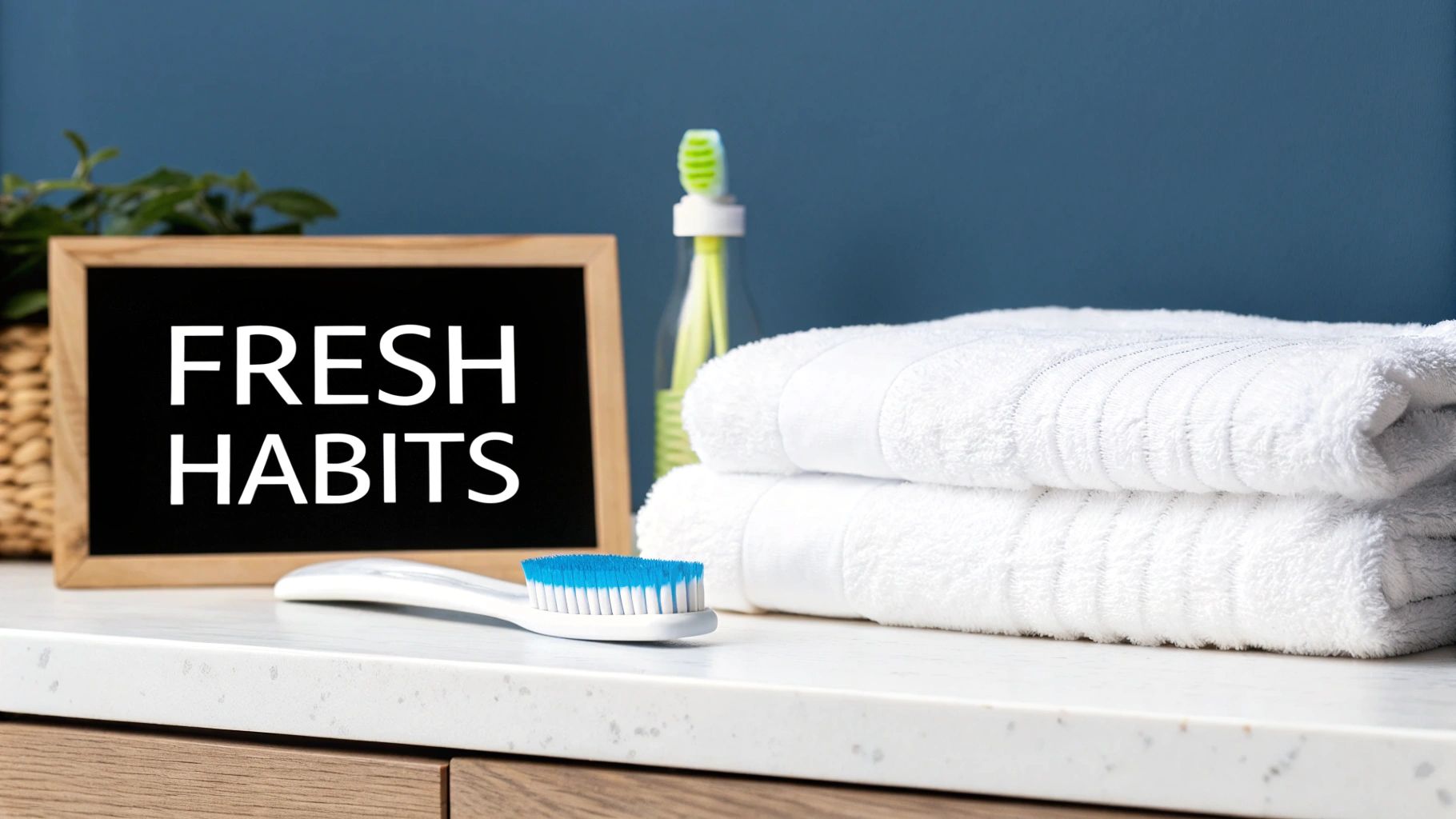Jan Elvis
25.09.2025

Jan Elvis
25.09.2025
When you think about smelling good, your mind probably jumps to a bottle of cologne. But what if I told you that the secret to a truly great personal scent isn't about what you spray on, but about the foundation you build from the inside out? It’s a strategy built on solid hygiene, a smart diet, and the right grooming habits—not just masking odors.
This is the blueprint for smelling clean and fresh, naturally.

Forget the idea that you need to douse yourself in a cloud of overpowering fragrance to make an impression. Real, lasting freshness comes from a series of smart choices that work with your body's chemistry, not against it. It's about developing a personal scent that feels authentic and effortless.
The whole point is to tackle odor at the source instead of just covering it up. This means looking at everything—from the soap you use in the shower to the food on your plate. Once you nail these fundamentals, you create a baseline of "clean" that becomes your natural state.
This entire approach really boils down to three simple but powerful pillars. Get these right, and you're golden. Each one builds on the last, creating a solid foundation for smelling great all day long.
This shift toward natural solutions isn't just some fringe trend; it's a massive movement. The global natural deodorant market hit about USD 1.2 billion in 2023 and is expected to reach USD 3.1 billion by 2032. You can dig into the numbers and see what's driving this growth over at Dataintelo.
The ultimate goal is to cultivate a subtle, signature scent that is uniquely yours. It’s a quiet confidence that doesn’t shout for attention but is noticeable up close, making a much more powerful and genuine impression.
Let's get one thing straight: learning how to smell good naturally all starts in the shower. This is your daily reset button. A few small changes here can make a world of difference, moving you from just washing away yesterday's grime to actively preventing odor at its source.
First up, that piping hot shower you love? It's time to dial it back. Scalding water feels incredible, but it's brutal on your skin, stripping away all the natural oils that keep it healthy and protected. This can cause dryness and irritation, messing with your skin's microbiome.
Switch to lukewarm water instead. It gets the job done without wreaking havoc.
While we're at it, take a look at your body wash. Most of the cheap stuff is packed with harsh sulfates that, just like hot water, strip your skin raw. A sulfate-free body wash is a game-changer. It cleans you up without destroying your skin's natural defenses. Healthy skin is your first line of defense against bad odor.
This same mindset applies to your face, by the way. You can get the full rundown on building a solid grooming habit in our complete skincare routine for men.
Body odor isn't actually from your sweat—it’s caused by bacteria on your skin having a feast. These little guys thrive in warm, damp places. So, to shut them down, you have to hit them where they live.
Give these areas extra attention every single time you shower:
Tossing in an exfoliation routine 1-2 times a week makes a huge difference, too. A natural scrub or a quick dry brush session before you hop in the shower sloughs off the dead skin cells that bacteria and odor cling to. It gives your soap a clean canvas to work on.
Here's the step almost everyone messes up: drying off properly. Bacteria need moisture to throw a party. If you leave your skin even slightly damp, especially in those key areas, you're rolling out the welcome mat for odor. Grab a clean, dry towel and be meticulous.
Once you’re bone dry, you've created the ideal base for staying fresh all day. Now is the time to apply a natural deodorant to clean skin. When your core hygiene is on point, you’re building an environment where odor-causing bacteria just can't get a foothold.
By focusing on these details—cooler water, better products, targeted cleaning, and thorough drying—you’re not just going through the motions. You're building a foundation of clean that actually lasts. That’s the real secret to smelling good naturally, without having to drown yourself in cologne.

A solid hygiene routine is your first line of defense, but what you eat plays a bigger role in your natural scent than most guys realize. It’s pretty simple when you think about it: everything you put in your body gets broken down. Those compounds eventually find their way into your bloodstream and get released through your sweat.
So, your diet is literally shaping your personal scent from the inside out. It's not just a myth that certain foods can leave you with a less-than-fresh body odor. By getting smart about what's on your plate, you gain a whole new level of control over how you smell.
Certain foods are well-known for containing compounds that can sour your natural aroma. The trick isn't to avoid them completely, but to understand how they work and maybe scale back before a big date or important meeting.
Here are a few of the usual suspects:
Don’t panic—you don’t need to swear off garlic bread forever. The key here is balance. Knowing which foods can affect your scent lets you make smarter choices on days you want to be at your absolute best.
Just as some foods can work against you, others can actively help neutralize bad odors and promote a cleaner, fresher scent from within. Think of them as your body's internal deodorizers.
Loading up on these is one of the easiest, most natural ways to smell better.
And that brings us to the simplest, most powerful tool in your arsenal: plain old water. Staying properly hydrated is non-negotiable. Guzzling enough water keeps your system flushed and makes your sweat far less concentrated and pungent. It's the easiest win you'll get.
Once you’ve got your hygiene and diet locked in, the final piece of the puzzle is choosing the right products to complement all that effort. This is a common stumbling block. Too many guys just grab the same harsh antiperspirant they've used since high school, but it's time for a smarter approach.
First, let's get one thing straight. Antiperspirants and deodorants are not the same thing. Antiperspirants use aluminum compounds to physically plug your sweat ducts. Sure, it stops sweat, but it also traps everything under your skin. Natural deodorants work differently. They let your body sweat—a natural and necessary function—while neutralizing the bacteria that actually cause odor.
Making this switch isn't just a niche trend; it’s a massive movement. The market for organic deodorants alone was valued at roughly USD 138.4 million in 2024. Experts predict it will skyrocket to over USD 316.1 billion by 2030. That’s a loud and clear message: people are waking up and caring more about what they put on their bodies.
Ditching your old stick for a natural one can feel a bit weird at first. The ingredient list looks completely different—no aluminum in sight. Instead, you'll find a handful of powerful, natural ingredients doing the heavy lifting.
Here's what you're likely to see:
To help you find the right fit, here’s a quick breakdown of the most common active ingredients you'll encounter.
| Ingredient | How It Works | Best For | Potential Drawbacks |
|---|---|---|---|
| Baking Soda | Creates an alkaline environment hostile to bacteria; absorbs moisture. | Heavy sweaters who don't have sensitive skin. | Can cause redness, rashes, and irritation due to its high pH. |
| Magnesium Hydroxide | Neutralizes odor-causing bacteria without altering skin pH. | Sensitive skin; those irritated by baking soda. | May be slightly less effective at moisture absorption. |
| Activated Charcoal | Adsorbs toxins, bacteria, and moisture due to its porous structure. | Oily skin; those looking for a "detox" effect. | Can be messy and may temporarily stain light-colored clothing. |
| Arrowroot/Cornstarch | Absorbs moisture to keep you feeling dry. | Anyone needing extra wetness protection. | Doesn't neutralize odor on its own; works best with other ingredients. |
Choosing the right formula is a personal journey. Don't be afraid to try a few different types to see what your body responds to best.
Just as important as your deodorant is what you wear over it. The right fabrics can make all the difference.

As you can see, natural fibers like cotton and linen are your best friends. They let your skin breathe, which is crucial when you’re using a deodorant that doesn't block your sweat glands.
Beyond your pits, you can create a unique personal scent without dousing yourself in a chemical-heavy cologne. This is where high-quality essential oils come into play. They give you a sophisticated, understated aroma that enhances your natural scent instead of just covering it up.
The goal isn’t to be smelled from across the room. It’s to have a clean, inviting scent that’s only noticeable up close. That’s what leaves a real, lasting impression.
For most guys, woody, earthy, and citrus notes work incredibly well with their natural body chemistry. A few great starting points are:
Now, this is critical: Never apply essential oils directly to your skin. These oils are highly concentrated and will cause some serious irritation. You have to dilute them first. Mix them with a carrier oil like jojoba or sweet almond oil. A high-quality, unscented beard oil works perfectly for this, too.
A safe ratio to start with is 2-3 drops of essential oil per teaspoon of carrier oil. Just mix a little in your palm and dab it on your pulse points—wrists, neck, behind the ears. The result is a subtle, lasting fragrance that's 100% yours.

You can have the perfect hygiene routine and a clean diet, but if you’re pulling on a shirt that’s already holding onto old odors, you’ve lost the battle before you’ve even left the house. Your clothing is a critical, and often overlooked, piece of the puzzle. The fabrics you wear act like a second skin, and they can either help you stay fresh or create the perfect environment for bad smells to thrive.
Think about it—your clothes are pressed against your skin all day long. They absorb sweat, body oils, and whatever else is going on. The right materials will manage this moisture and keep you comfortable, while the wrong ones will just trap it all, turning your favorite tee into a petri dish for bacteria.
The single most important thing to look for in your clothes is breathability. This is where natural fibers really shine. They let air circulate freely, which helps sweat evaporate quickly before odor-causing bacteria can get to work. Synthetic fabrics, on the other hand, often do the exact opposite.
The takeaway is simple: stick with natural fibers for your everyday clothes whenever you can. Save the synthetics for the gym, and get them in the wash immediately after your workout.
Even the best fabrics will start to smell if your laundry game is weak. A few small tweaks to how you wash your clothes can make a huge difference, leaving them smelling genuinely clean instead of just being masked by heavy fragrances.
The golden rule? Never let sweaty clothes sit around. Don't just ball them up and toss them in the hamper to fester for a week. If you can't wash them right away, at least hang them up to air out completely. A damp, crumpled-up pile of gym gear is basically a party invitation for bacteria.
Here are a few game-changing laundry tips:
Whenever you decide to shake up your grooming routine, you're bound to have questions. It’s totally normal to hit a few snags when you're figuring out how to smell good the natural way. Let's walk through some of the most common issues guys run into.
This is probably the number one question I get. If you’ve been swiping on aluminum-based antiperspirant for years, your body has some serious recalibrating to do. You need to brace yourself for what some people call an "armpit detox," which can last anywhere from two to four weeks.
During this time, your sweat glands are finally unclogged and free to function properly. The catch? You might feel a lot wetter and even notice a stronger smell at first. Don't bail—it's just a temporary phase. Your body is pushing out all the gunk that's built up and rebalancing its natural microbiome. If you stick it out, you'll find the natural deodorant starts working way better on the other side.
Pro Tip: To help things along, try an underarm clay mask once a week. Mix some bentonite clay with a bit of water to make a paste, slap it on for 10-15 minutes, and rinse it off. It can really help pull out impurities and might even speed up the whole detox process.
One hundred percent, yes. The goal isn't to smell like nothing; it's to cultivate a clean, subtle, and genuinely pleasant personal scent. When you have a solid foundation of great hygiene, a healthy diet, and clothes that actually breathe, your natural baseline scent becomes neutral and even appealing.
Think of it like this: your natural scent should be something that’s discovered, not announced from across the room. A couple of drops of a quality essential oil, like sandalwood or bergamot, can add a nice touch without the chemical-heavy punch of synthetic fragrances. Honestly, a lot of people find that kind of subtle, personal scent way more attractive.
Bad breath can tank your confidence and undo all your other efforts, but the fixes are pretty straightforward. It all starts with the non-negotiables: brushing twice daily, flossing every single day, and getting a tongue scraper to clear off that film of bacteria.
From there, a few extra habits can make a world of difference:
Finally, don't overlook body hair management. Keeping areas like your underarms trimmed reduces the surface area where sweat and bacteria can hang out and cause trouble. If you find that shaving leaves you with bumps and irritation, check out our guide on how to prevent ingrown hairs for some practical solutions.
At Main Character, we're all about building the kind of discipline and healthy routines that forge real confidence. Our premium personal care products are designed to back you up every step of the way. Reclaim your confidence and build a routine that works by checking out our collection at https://www.dontlooktrash.com.